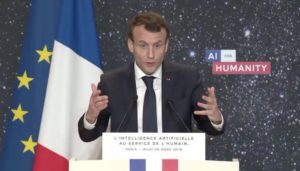President Emmanuel Macron of France, in a recent speech and interview with Wired magazine on Artificial Intelligence. provided some valuable insights and comments, which concur with the ICT4Peace Foundation’s work, output and position on the ethics of AI development, and its application. For society, politics, peace and the transformation of violent conflict, AI offers exciting new potential and possibilities. President Macron’s proposals, for France and beyond, will be key in steering AI development towards goals that are beneficial for all, processes that are accountable, technologies that strengthen universal human rights, platforms that do not algorithmically discriminate and services that benefit the most at risk, the under privileged and the under-served.
 Photo courtesy Wired magazine
Photo courtesy Wired magazine
 Photo courtesy Periscope
Photo courtesy Periscope
Most recently, ICT4Peace Foundation and the Zurich Hub for Ethics and Technology (ZHET) published ‘Artificial Intelligence (AI): Autonomous Technology (AT), Lethal Autonomous Weapons Systems (LAWS) and Peace Time Threats’ by Regina Surber, Scientific Advisor, ICT4Peace Foundation and the Zurich Hub for Ethics and Technology (ZHET). The paper can be found here, and unearths the current paradigm shift in human technological creation and self-understanding that underlies the ongoing debate on AT and LAWS: The fact that humans are creating technological artefacts that may lose their instrumental character because we gradually give away control and responsibility for the outcomes of their usage. Locating the core challenge of AT, AI and any emerging technology in this still subtle but pervasive change in the understanding of the human-technology relationship, this paper will also provide conclusions and recommendations that are of a more general and long-term character.
The Annex includes eleven lists of principles for ethical and responsible research on AI, AT and Robotics.
More output by ZHET and the ICT4Peace Foundation on AI can be found here.
President Macron avers that “AI will raise a lot of issues in ethics, in politics, it will question our democracy and our collective preferences.” We concur. The President goes on to say that “The key driver should not only be technological progress, but human progress. This is a huge issue.” This is entirely congruent with the ICT4Peace Foundation’s position on AI. In January 2018, we noted that the need for urgent recommendations “to generate a more holistic understanding of all the peace and security implications of autonomous technology in general and new technologies (also Life Sciences, Biotechnology, Synthetic Biology) in particular, as well as the recommendation to develop a comprehensive position by the international community and the UN on these risks. To that end an urgent and increased engagement by all stake-holders including Governments, industry, academia and civil society is required.”
In complete concordance with the ICT4Peace Foundation’s recommendations, President Macron is most direct and unequivocal on the need for AI algorithms to be non-discriminatory. The need is urgent and the call is increasingly for algorithmic transparency, which is a point the Foundation has also made to the highest levels of the UN in New York, during meetings on crisis information management.
Towards the end of an insightful, forward looking, grounded interview with Wired on AI, President Macron notes that ultimately, the litmus test of AI will be whether it generates trust amongst users and citizens. This is something governments, the UN, private actors and other stakeholders including civil society need to ensure. This in turn only possibly by a more robust, sustained debate and discussion on AI, to which the ICT4Peace Foundation and the Zurich Hub for Ethics and Technology remain committed to.
We are open to collaboration and conversation.
